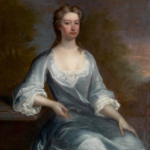Days spent entirely at home. New routines to follow, days to plan and hours to occupy?
Are you finding yourself craving the routine that many of us have had to set aside temporarily?
Over the past few weeks words like social distancing, isolation and cocooning have become part of our regular vocabulary and part of our daily lives. So how has this influenced our behaviour? Initially the lack of a necessary routine is attractive I think you would agree, but I, for one, am a creature of habit. Where I regularly offered excuses of not having the time to take time out, I now find that days without a sense of purpose are exactly what I don’t want.
Back in the eighteenth-century ladies of good fortune like Katherine Conolly and Lady Louisa of Castletown House also enjoyed a sense of purpose. Planning the day would be attended to first thing, and everything set in place for how the day would run. The lady of the house had a household to run, so menus to sort and tasks to be assigned, all to ensure that any social commentary would be favourable.
So yes, routines existed, and their days were not without purpose. Leisure time was also important, Katherine was an avid card player and not only that, she appears to have been a woman with a wonderful sense of adventure as she enjoyed carriage racing up and down the avenue at Castletown! Now I am not advocating this as a leisure pursuit but isn’t this our time to revisit activities that we used to enjoy?
Perhaps you have a creative side like Lady Louisa. She spent many years working on her print room, gathering and trimming prints to hang. Have you ever wanted to paint a scene, to write a story, to make a hat, to learn something new? Maybe now is the time! No matter whether you are isolating or cocooning, working from home or otherwise, we are all at home for longer periods of time than ever before.
A certain Mary Granville who was born in 1700 found herself married off for political and financial reasons at 17 to Anthony Pendarves, a man considerably older than her. She resisted the marriage in vain and for the next seven years lived with a man she considered ugly and disagreeable and who was rarely sober. When he died in 1724, she did not rush into a second marriage and despite opportunities to marry, stayed a widow until 1743. In that year she married Patrick Delaney; a church of Ireland minister, later to become the Dean of Down, and lived at his house at Delville in Glasnevin. Mary was a sharp, witty and gifted lady who was forever busy ‘even between the coolings of her tea’. She wrote and illustrated a novel, made shellwork, silhouettes, was very accomplished at embroidery and with an interest in fashion made her own compositions. When she was again widowed, she returned to England and at the age of 72 began her most accomplished works of flower collages in amazing botanical detail. This began when she noticed the likeness between a geranium and some red paper and picking up a pair of scissors so began her creation of over 1000 ‘mosaicks’.
So not a lady to let the grass grow under her feet nor to be defeated by the challenges that life gave her. She is wonderfully brought to life through her diaries and many letters. A woman who saw the world in rich detail. In her own words ‘would enjoy the moon in her full lustre’, enjoy the ‘sweet flowers’ and ‘the river that winds in many places’.
A woman who did not mince her words and who commented sharply on Katherine Conolly as’ a plain and vulgar woman in her manner’ but whom she also regarded ‘was clever at business ,wrote all her own letters and who could read a newspaper by candlelight with spectacles!
Perhaps it was as well that Katherine was not at home when Mrs Delaney called to Castletown House as she found it to be ‘a large heavy building, a great deal of room in it, but not laid out with good taste, the furniture good but not disposed to the best advantage’ Ouch!
Mrs Delaney in 1770 wrote of lecturing her family on the benefits of rising early who ‘for want of the usual bell that used to call them up they are later and later’. A lady who ‘rose at seven, had prayers and breakfast over by nine’.
Three hundred later it seems not much has changed. Have alarms stopped ringing in your home? It seems to me that we are all the better for the daily routines which give us a purpose and a sense of achievement at the end of the day.
And if, like me, you remember many ventures you thought you might enjoy but never had the time, well I think we’ve run out of excuses.
That said, if you are on the frontline working long days and nights to keep us all safe, with an indomitable spirit a little like Mrs Delaney’s, your dedication is commendable, and we applaud you.
What might you do at 72? Or at any age?
Pauline Flanagan



